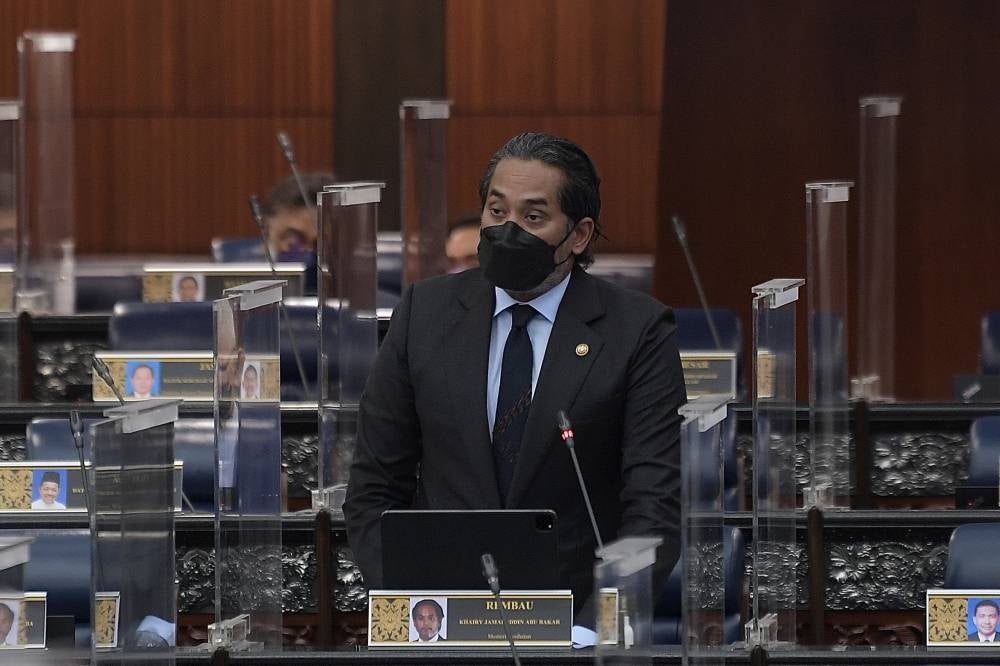Booster deadline extension nothing to do with Johor polls - Khairy

KUALA LUMPUR - The deadline extension for Sinovac recipients aged 18 and above and senior citizens aged 60 and above to obtain their booster dose until March 31 has nothing to do with the Johor state election, said Health Minister Khairy Jamaluddin.
He said the extension was to give time to the two groups to complete their booster dose injections as many of them still had not received the dose.
"There are also many requests from this group to extend the period for them to take this booster dose. This is the last extension, it is final, and if by March 31 they still do not take the booster dose, their vaccine status will be changed to ‘incomplete’,” he said during a question and answer session at the Dewan Rakyat sitting today.
He said this in his reply to a question from Datuk Seri Dr Dzulkefly Ahmad (PH-Kuala Selangor) who wanted to know whether the reason for the extension of the booster dose for the two groups until March 31 had anything to do with the Johor polls.
Meanwhile, Khairy said the move to open the vaccination centre (PPV) on a walk-in basis and provide booster dose vaccine options was aimed at helping to increase the number of booster dose recipients in the country.
Previously, the Health Ministry said that vaccine recipients aged 60 and above and Sinovac recipients aged 18 and above must obtain their booster dose before Feb 28 to maintain fully vaccinated status.
Meanwhile, for the Covid-19 vaccines for children aged five to 11, Khairy said Sarawak recorded the highest number of recipients for the group with 57 per cent of the children in the state have received at least the first dose.
In his reply to a question from Oscar Lin Chai Yew (PH-Sibu) who wanted the ministry to state the seriousness of Omicron compared with other variants, Khairy said although the sharp increase was recorded, over 99 per cent of daily cases recorded were in categories 1 and 2 only.
"Although there was an upward trend in hospital admissions during this Omicron wave, the discharge rate from the hospital also rose sharply given the high recovery rate and the short duration of treatment in the hospital,” he said.
He said, compared with the Delta variant, the Omicron variant seemed to infect the upper respiratory tract and this trait adds value to its ability to infect easily and quickly.
Apart from that, he said, the Omicron variant was found to have less capacity to infect lung tissue and this explains why individuals infected with the variant have a milder infection than the Delta variant.
According to Khairy, there has been an increase in the number of Intensive Care Unit (ICU) bed use and daily deaths during the epidemiology week 5, but it is 80 to 90 percent lower compared with August last year during the Delta wave, although cases are currently higher.
"One of the factors is that 78.9 per cent of the Malaysian population has received a complete vaccination; the regression rate of Covid-19 patients to categories 3 to 5 is low, the recovery rate is high, as well as the duration of treatment in the hospital is not prolonged,” he said.
He also said that the ministry has implemented various measures in facing the challenges of the Omicron wave, including administering booster doses, improving the management of Covid-19 through the automated FTTIS (Find, Test, Trace, Isolate and Support) approach, and joint ventures with private health facilities.
Other steps are to develop the Covid-19 Clinical Care Pathway to introduce the latest antiviral drugs to treat high-risk patients in the early stages of infection and reactivate the National Rapid Response Task Force (RRTF) 2.0 starting Feb 7. - BERNAMA










